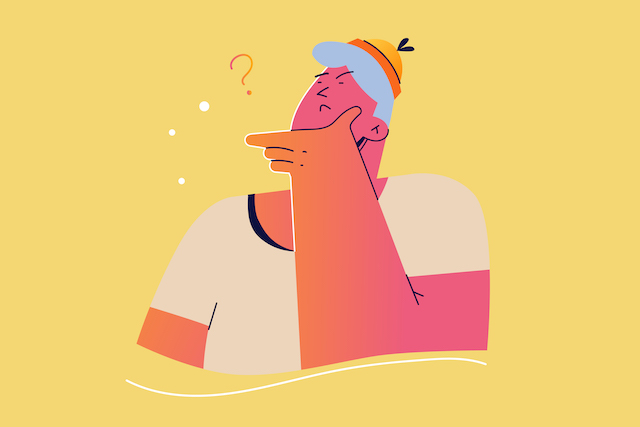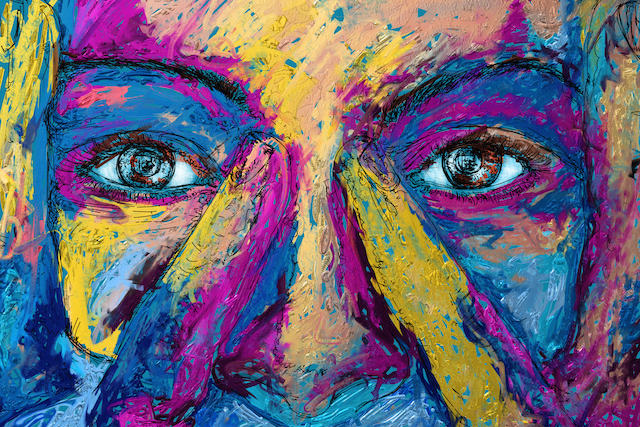
“If your mind is empty, it is always ready for anything, it is open to everything. In the beginner’s mind there are many possibilities, but in the expert’s mind there are few.” ~Shunryu Suzuki
So many of us come to meditation through our suffering. Nearly everyone who has come to walk the spiritual path can spin a tale of sorrow, frustration, and often devastation. Through our life struggles and difficulties, we become conditioned into habitual patternings of mind that seem to offer us no escape, and often turn to meditation to find relief.
I always say that anxiety was my first spiritual teacher and it began teaching me at a very young age.
I spent a great deal of time and effort attempting to control my experience in order to limit my suffering. I’ve now come to see that the illusion of control is the root of anxiety, as our stresses are exacerbated by our inability to accept “not knowing” what will happen in life.
In my early forties life handed me a situation that would eventually overpower my ability to control life. Over a seven-year span, my son Mark struggled mightily, suffered deeply, and fought gallantly to try to fend off addiction and mental illness.
Lost within my own mental struggles, I attempted to meet his difficulties through my habitual need to control life. Anyone who has ever had a loved one suffering with addiction knows that we’re never in control of the situation. Nevertheless, I foolishly pressed forward and selfishly tried to control Mark’s experience.
I can remember the day Mark was diagnosed with schizophrenia. My inner controller had an “I can’t do this anymore” moment and finally came to the stark realization that there was no way for me to control his situation.
Something shifted within me, and I felt the “controller” release its grasp on me. There was nothing to control. There was just life moving, and life was just meant to be lived as it comes.
Tragically Mark lost his fight against addiction in 2017. I’ve come to see that Mark was my spiritual guru the entire time, teaching me about compassion, how to love unconditionally, and how to let go of the need to control life.
Mark opened the doorway to meditation for me by teaching my how to let go. He opened up my heart to accepting what is, as it is and taught me how to start shedding my mind’s old habitual patterns of conditioning.
I’ve been formally “sitting” for about four years, and although I feel very good about my practice now, I’ve made my fair share of “mistakes” along the way.
One of the biggest errors I made was trying to use meditation as a means to an end. I wanted to feel better and thought if I sat “well” enough then I would find peace. I initially failed to realize that this mind that was trying so hard to find relief from suffering was the same mind that had created my suffering.
I spent a lot of time spinning my wheels trying to find the right formula to quiet my mind. I thought if I concentrated hard enough, if I focused on the breath the right way, if I limited external noises and distractions… then my mind would quiet down and I would find truth. The mind was the one constantly looking for the right formula, the right path, the right insight.
It took me nearly two years to finally realize that no matter what the mind decided, if the method came from the mind, it would actually prevent me from relaxing into the silence beyond the mind.
This was just one of the many mistakes I’ve made. Putting too much emphasis on how long I sat in meditation, trying to recreate blissful feelings, trying to determine if I was enlightened or not, all contributed to perpetuating my monkey mind.
If you’ve had similar frustrations with your practice, don’t be discouraged. Don’t stop. There’s no wrong way to meditate, because all “mistakes” only serve to exacerbate our suffering, and therefore increase our earnestness to come back to try meditation again. Life is very good at putting in fail-safes against our own ineptness.
If you’ve started meditation and stopped, started and stopped, let years go by, started again and stopped, you’re in good company. Everyone gets frustrated and quits a few times before developing a good practice. In actuality, one must stop “attempting” to meditate before one actually begins to awaken to what meditation is all about.
So let’s go into a bit more detail on these mistakes we want to avoid…
1. Trying to quiet the mind
As I touched on earlier, the number one reason we sit in meditation is we desperately want to silence the inane chatter within our mind. Our monkey mind is quite relentless. It’s like the Terminator: “It can’t be bargained with. It can’t be reasoned with. It doesn’t feel pity, or remorse, or fear. And it absolutely will not stop, ever, until you are…” spiritually awakened.
So why shouldn’t we try to quiet the mind?
The best way to answer this is to ask: Who is trying to silence the mind? Take your time and examine this. What you will find is that your mind is trying to quiet the mind. How could that which is the root cause of the problem also be the source of the solution? It can’t. It won’t listen to our desire to be freed. It’s only interested in furthering its continuity and increasing its own significance.
Our mind wanting to quiet our mind creates additional inner conflict. This inner conflict provides more fuel to the mind, and so our attempt to meditate and quiet the mind has only led to more struggles and frustration.
In order to circumvent this dilemma, we must “do nothing.” Just sit and observe whatever comes and goes. Patient, passive, non-reactive observation is your superpower. Whatever thoughts arise, let them come. Whatever thoughts go, let them go.
It might take a bit of time to settle into observer mode, but once we realize it’s possible to sit and observe the mind from a point of neutral awareness, the mind’s reign of terror is coming near to an end.
2. Sitting too long too soon
I think many of us sit down in meditation envisioning a transformation into a Zen Master on day one. We’ve heard that an hour of meditation is a really good meditation, so we decide to sit for an hour.
Within the first minute we’ve relived every embarrassing event in our life from preschool up until this current moment. We sit and wrestle with our thoughts like a chihuahua puppy tied to a firehose on full blast. We’re tossed around like a rag doll in this mental octagon by our own mind. Beaten to a bloody emotional pulp. Our will is broken…
We quit after five minutes and vow to never sit in meditation ever again.
Don’t do this to yourself. Start slow! Meditation is no different than lifting weights. If you try to do too much too soon, you will only end up hurting yourself.
Do one or two minutes for the first week or two. Add a minute or two every week after that and try to slowly work your way up to at least twenty minutes per day.
This is not a competition. You don’t get any awards for persevering through harsh conditions or adversity. Enjoy the journey. Take your time.
3. Quitting too soon
So we’ve worked our way up to twenty minutes a day. We’ve sat for twenty minutes for two days now and we feel… nothing. Everything feels the same. The mind is still wandering. The monkey mind is still in charge, still kicking us around, and we’re getting frustrated.
The mind is whispering that this is all a really big waste of time and you’ve fallen for it again! How long are you going to listen to that spiritual guru who is unemployed and has no money? Of course he is at peace. He doesn’t ever do anything…
Don’t give into the mind.
Meditation is like walking in fog. We don’t notice much of anything going on, and then we realize that we are soaking wet. If the mind begins to pressure us about sitting without seeing any results, then just observe those thoughts as well.
There is no set time frame for the mind to settle down, but if you are patient you will begin to experience “gaps” of silence in the mind. These small gaps are a good indication that the mind is getting tired of not getting a reaction out of us. So, be patient. Relax. Take up the attitude that you will sit until your last breath, and having no results is not going to deter you.
4. Trying to recreate meditative phenomena
The bliss! Give me some more of that bliss. Can never have enough bliss! Anyone who has come to experience the feeling of euphoric bliss in meditation has definitely tried to recreate it. If you say that you haven’t, you’re lying.
Anything that occurs within the meditation is phenomena. Bliss, lights, colors, auras, sounds, images, dreams, out-of-body experiences, clairvoyance, receiving messages, full-body orgasmic euphoria, alien contact, angels, numbers, time travel, space travel… It’s all just phenomena and it has no real significance in the grand scheme of awakening.
If you become infatuated with phenomena, this means that the mind has become infatuated with phenomena. The point of meditation is to relax into the awareness of life moving. Awareness of life moving includes awareness of mind moving. If we “fall into” the role of mind trying to recreate our meditative experience, then we’ve most likely fallen out of the neutral witness role.
A good rule to remember is to relax and allow whatever comes to come and allow whatever goes to go. Nothing needs to be created. Nothing needs to be removed. Just relax with what is.
5. Holding any expectations about your practice
It’s natural to begin a meditative practice because we want to feel better. Our mind is giving us trouble. Our relationships never work out. We are overworked, underpaid, and complete balls of stress. We are grieving over loss. We are tired. We sometimes just want to give up. It’s all too much.
Again, who wants to feel better? Who is holding this expectation that meditation is the cure all that we’ve been waiting for? The mind! The mind is interested in feeling better, so again, we are creating more inner conflict. The mind doesn’t like the way life is moving, it wants to make life better. We are playing tug of war with ourselves…
Any expectation of getting something out of meditation delays getting anything from meditation. If you don’t want anything, then you will get something. That something is peace of mind.
Peace of mind arises with the deepening of awareness of what is. When we sit in meditation without expectation, the mind’s inner conflict dissolves. There’s no fuel added to the mind when we don’t expect to get anything. Relaxation without expectation is how the mind begins to quiet down.
—
So, to summarize, even though we may make some or all of these five meditation mistakes, life will continue to use our suffering as a way to bring us back to our spiritual practice and back to meditation.
Don’t try to quiet your mind. Don’t try too much too soon. Don’t quit too soon. Don’t try to recreate a pleasurable meditation session. Don’t hold any expectations.
Just sit. Relax and be with what is.
![]()
About William Howells
William Howells is an avid writer and Spiritual advisor based in New Jersey who uses what he has learned through his own Spiritual Awakening to help transform the lives of others. He is extremely passionate about his pointings of the Heart and has a deep desire to help Spiritual Seekers Awaken to the Truth of this Existence. Follow his Twitter account https://twitter.com/TGinormous for daily quotes and inspiration.
Get in the conversation! Click here to leave a comment on the site.
The post 5 Meditation “Mistakes” That Increase Our Suffering appeared first on Tiny Buddha.
from Tiny Buddha https://ift.tt/2HKOckP











